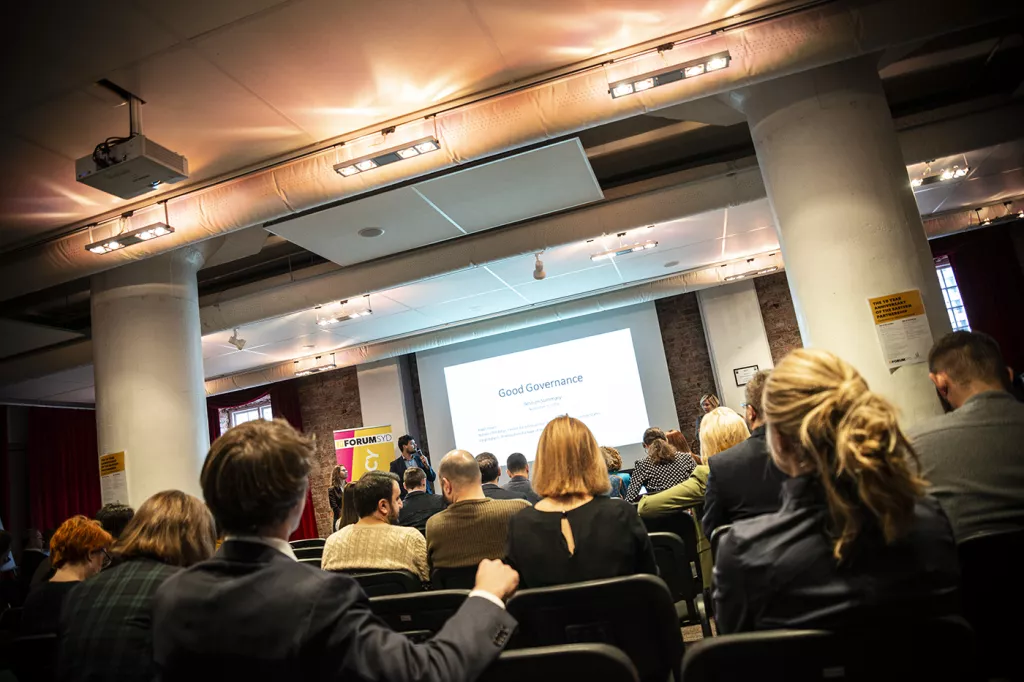Civil society representatives unites for joint recommendations to the EU

While the EU is preparing for the never-ending Brexit saga are some of its neighbors in the east doing their best to do the opposite – joining the union.
As hard as it is to leave, even harder can it be for countries still lacking fundamental freedoms and human rights to join. While the financial opportunities are enticing the demands for democracy and human rights are less thrilling for some leaders to accept.
That’s why Forum Syd brings organisations, media experts and think-tanks from all countries in the EaP region and the EU to reach common solutions and joint approaches on what efforts that are needed to strengthen the civil society, now and in the future.
- It is crucial to have conferences like this where civil society organisations like us can raise our voices towards the EU on what is really needed, says Teona Lebabidze from the UN Association of Georgia.
The conference also took a meta approach questioning if the EU really has the monopoly to call human rights and freedom of speech to be European values rather than universal values. Especially in times of shrinking space and backlash against civil society in countries like Hungaria and Poland.
- We must make sure that lawmakers also walk the talk and live up to their promises of change, says Teona Lebanidze
The demands are many, reforms are necessary and the current situation for the civil society in the EaP region varies a lot depending on where you look, but many of the challenges of especially media freedom, good governance and gender equality is similar throughout the whole region. Among the participants, businesses and SMEs were also present to share their views of challenges and possibilities that exist.
The ten year anniversary for EaP took place at several places in Stockholm. There were also events hosted by the Swedish Ministry of Foriegn Affairs, Sida and the Swedish parliament.
- It’s very interesting to have such a diverse group gathered to reflect on our future and topics like gender mainstreaming. It’s important that conferences like this don’t end up to homogenous, says Mikayel Hovhannisyan from Eurasia Partnership Foundation.
Collaboations with a result
The event resulted in conclusions on what efforts that are needed for a fair and sustainable development for the civil society, and how the cooperation between the six countries in the EaP and the EU can be stronger, more inclusive and effective.
- The EU has an important role to play. The democratization of Armenia was a much smoother process thanks to their support, says Mikayel Hovhannisyan
During the final day, the participants produced a common list of recommendations to be presented to the European Commission as a joint input from the civil society in the region on what must happen to strengthen the region, in terms of rights and freedoms, rule of law, media literacy and anti-corruption.
This event was part of the Swedish effort to highlighted and celebrated that it is 10 years since the establishment of the EaP as a region, and that it is now timely to discuss what focus areas that are needed in the EaP and the EU for the future of the cooperation for 2020 and beyond.
Other recent articles

The power of people powered Public-Private Partnerships
Public–Private Partnerships (PPPs) are often discussed in terms of roads, power plants, housing, and other large infrastructure projects. But as discussed on the People’s Partnership Podcast, PPPs are...

ForumCiv’s social media accounts labelled as “extremist materials” in Belarus
Important message to our Belarusian followers. Any interaction with our content can now lead to legal consequences in Belarus. Please read the information below and take the necessary precautions for...

ForumCiv enters new strategic partnership
ForumCiv is proud to announce a new three-year strategic partnership with Sida, totalling SEK 137 million.